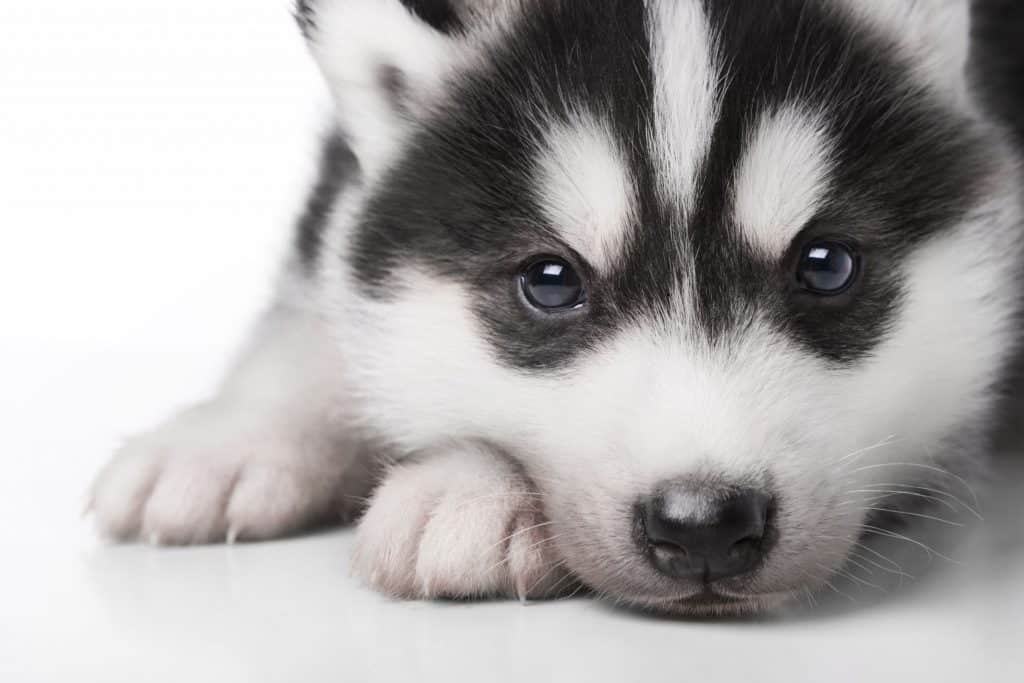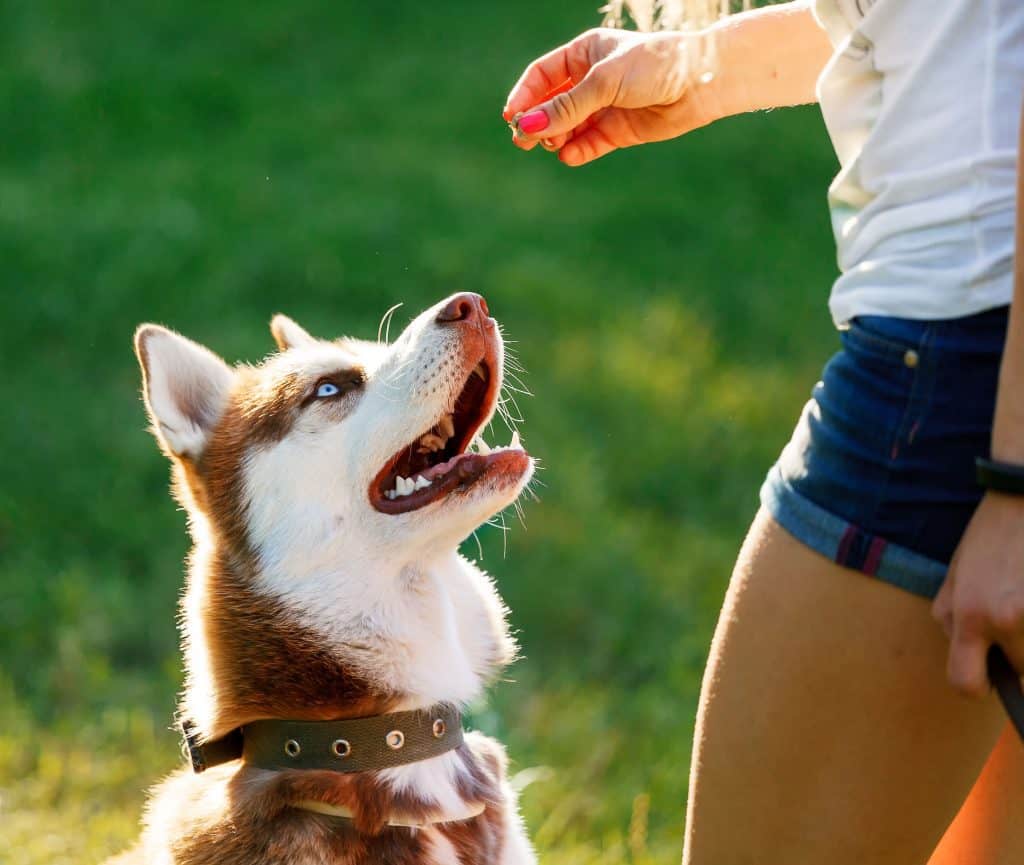Husky Intelligence: How Smart Can You Expect Them to Be?

Huskies are beautiful dogs, and one of the most wanted breeds. They make great pets, but I was wondering how intelligent they are. Below I did some further research, this is what I have found.
How smart are huskies?
Huskies are very intelligent, independent dogs. They were bred to be working dogs and are known as an intelligent breed. Huskies may be slightly more difficult to train, not because they don’t understand what you are trying to get them to do, but because they can be stubborn.
Huskies are a more complicated breed when it comes to intelligence and personality. If you are interested in learning more about husky intelligence, temperament and personality, history, and more keep reading.
Husky Intelligence
As stated above, Huskies are one of the most intelligent breeds of dog. They are even ranked number two on the list of top ten smartest dog breeds by dogster.com.
But, Huskies are a different kind of intelligent. They are not your average intelligent dog breed, that is very obedient, easy to train, and willing to listen.
The very thing that makes Huskies so intelligent is their independence. They are very good at taking care of themselves and navigating their way around.
Because Huskies are so intelligent, they are also very stubborn. They are known for being very independent; this makes them difficult to train.
It’s not that they aren’t smart enough to figure out what you want them to do, it’s that they are so smart that they will decide if they want to do what you are saying or not.
They will be the one to decide if it is worth their time, and if it isn’t then they won’t bother.
This is one reason that Huskies are difficult to own for some people. They tend to be unpredictable when it comes to wanting them to do something.
One day they could come right when you call them, and the next day they are running down the street completely ignoring your command. Which can be frustrating to some owners.
They also act on their instincts. This may be annoying sometimes, but almost everything they do has a purpose, contributing to their intelligence.
They were bred to take care of themselves, and survive. They are known for digging a lot. They will often do this for shelter, to hide things, or even to catch an animal they saw.
They don’t need much food to survive and are capable of finding their own. This is what makes them bad around animals such as cats, or smaller animals around the house.
Huskies are not aggressive dogs but have been known to kill or eat cats, even if they have lived with them for months or years. It is best to keep Huskies away from smaller animals, or not have smaller animals around.
Huskies are made to run, literally. They were originally bred to pull sleds and run for miles. That part of breeding is carried over until now. There are many stories of owners that confine their Husky, and it does everything it can to escape.
They hop fences, dig holes under gates, and things that are much more intricate and well thought depending on what is keeping them confined.
If Huskies often escape, they will run until they don’t want to anymore. The more you chase the more they will run, until they are good and ready to come back, but luckily they are great navigators.
Another thing that ranks them high on the list of intelligence is their ability to navigate. This comes from their days as sled dogs.
Even without a driver, they are known to be able to find their way back home, even if it is hundreds of miles away. They are attentive and aware of their surroundings.
Husky Temperament and Personality
Huskies are a very popular breed. Even though Huskies are independent and stubborn, this does not mean they are bad pets or bad dogs at all.
They are actually ranked number 12 out of 193 for breed popularity according to the American Kennel Club.
| Year | Huskies Rank of Most Popular Breed (Out of 193) |
| 2017 | 12 |
| 2016 | 12 |
| 2015 | 12 |
| 2014 | 13 |
| 2013 | 14 |
Information for table acquired from akc.org
So what makes them such a popular breed to have? Their temperament and personality make them a very loving and lovable dog.
One of the main things that people say about Huskies is that they are not guard dogs. They are not aggressive, protective, or suspicious toward strangers.
They treat strangers as if they are a part of the family, and are hardly ever cautious toward people they don’t know.
They are sociable animals. They not only love people but other dogs as well. They are pack animals, so they will even prefer other dogs over people sometimes.
It is recommended not to have more than two huskies living in the same household at a time because they are more mischievous and get into more trouble when in a pack.
They are also very energetic and puppy-like dogs. Even when they get into their adult stages of life, they maintain the love to play and goof around. They love to run, play, and exercise.
They are also known to have a goofy personality. They are quirky, and funny dogs, that cause a lot of laughs for their family.
They have a love for life, and always seem to be having a good time. They aren’t know to bark, but they are far from quiet.
They love to whine, moan, and howl to get attention, and can often sound like they are signing.
They are very loving, and affectionate animals. They are a popular breed for therapy animals because of their tendencies to be good with strangers, intelligence, and affectionate personality.
History of the Husky
Huskies were originally bred in Northeastern Asia by the Chukchi people. They used Huskies as both companion pets and also sled dogs.
When hunting, and food became scarce they would travel hundreds of miles by sleds pulled by a pack of Huskies.
Huskies started gaining popularity in the early 1900s when sled racing became popular with this breed of dog.
Huskies started to get recognition and growing in popularity. At one point sleds pulled by Huskies were the most popular form of transportation in arctic communities, before the invention of the aircraft and snowmobiles.
One of the most important events in History for huskies, that made their popularity grow immensely, was the Serum Run to Nome in 1925.
In 1925 the town of Nome, Alaska was struck with an illness and needed a serum to help heal the community.
Unfortunately, the Serum was 674 miles away in another town in Alaska. The people had no way to retrieve it or have it delivered.
Until a man named Leonhard Seppala introduced his team of 150 huskies. They ran the 674 miles with the sled in five and a half days.
The lead husky for the last stretch of the run, Balto, went down in history as a hero and to this day is one of the most famous dogs in history, with a statue in the town of Anchorage, Alaska and Central Park in New York City.
This caused a great deal of attention to Huskies, granting them a large rise in popularity around the world.
They are still popular around the world, and there are even some sled dog teams lead by huskies left.
6 Training Tips for Huskies

As we have learned, while Huskies are very smart, they aren’t the most willing to obey. This can make training very hard, as they can be unpredictable when it comes to listening, no matter how well they are trained.
Training a new Husky can seem scary and intimidating especially if you’ve never trained a dog before. Below I have listed a few tips to help in the training of your new (or old) Husky.
#1: Start Young
This is one of the most important tips I can give when it comes to training a Husky. Huskies are stubborn and want to dance to the beat of their own drum.
By starting training when your Husky is still a puppy (as young as possible), whatever they are trained is all they will know.
They will see a reason to follow what you are saying because that’s how it’s always been.
For example, if they have never been able to get on the couch, they are much more likely to not get on the couch when they are grown, but if you get a new couch when your Husky is a few years old, and suddenly they aren’t allowed to get on the couch anymore, they probably won’t listen because they don’t see a purpose or a reason for why they aren’t allowed to get on the couch.
#2: Spend Time with Your Husky
Spending time and bonding with your Husky is super important when it comes to obedience and training.
You need to build a bond with your dog, which is easiest to do when they are young. By spending time with your Husky and treating them with love and kindness, you are building a bond with them and allowing them to trust you.
Huskies are independent thinkers meaning they do things when they see a purpose. If your Husky has a bond with you and trusts you, they will trust when you tell them to do something.
You need to treat your husky with respect so that they will respect you back.
Many times when people train Huskies, or any dog for that matter, they train with fear.
If the dog doesn’t do what they are supposed to or doesn’t listen,
This is especially important to remember for Huskies who are so independent.
If they are living in fear or feeling forced to do something, they will escape (which they are known to be very good at), and won’t come back, or start acting out and being worse.
#3: Provide Your Husky with Positive Reinforcement
When your Husky does what they are supposed to, give them verbal praise.
Tell them they are a good dog, give them scratches and love. If they are still in the training phases, you can even treat them.
Great treats to give are baby carrots or training treats in smaller portions for your dog so you don’t overfeed them with treats.
Here is a link to a example of good training treats to use that you can purchase on Amazon.
By giving your Husky positive reenforcment and rewards, you are giving your Husky an incentive and a reason to do what they are supposed to.
They love affection and, even though it may not seem like it sometimes, they love to please their owner as well.
#4: Practice Persistence and Patience
This is another very important tip. You have to make sure you are persistent with your Husky pup.
Don’t let them take advantage of you if you tell them to sit, make sure they at least show progress toward sitting. Don’t give up, or let your husky trick you into thinking they don’t know what they are supposed to do.
But don’t mistake persistence for forcing your husky to do something. You can be strict without being mean.
Always practice patience with training. As my mom used to tell me, “If you act like you have 15 minutes to do something it will take you all day, but if you act like you have all day to do something, it will take you 15 minutes.”
You shouldn’t try to rush your Husky into anything they aren’t ready for. This will only end in frustration on both ends.
Take your time, and let your Husky learn however long it takes. Remember that even baby steps take progress.
#5: Always End a Training Session on a Good Note
It is not good to spend hours on one training session. Your Husky is not going to want to sit through that, when all they want to do is go play.
The ideal training time is 10 to 15 minutes per session, and one to two sessions a day. This may not seem like long, but in the end it will be a way more effective way of training.
If you train longer than that your Husky will lose interest and not want to listen anymore.
Always end training on a good note, and on your terms. This may make your session shorter, but if your husky does exactly what you want it to, it’s not a bad idea to cut your training a little short.
Give them a lot of praise, and let them go play. It is always better to leave them wanting more, instead of trying to force them to keep their attention.
That way, they will have positive associations with training and want to continue to learn and train in the future.
Last but not least, don’t give up on your Husky, even if things get hard.
Even though Huskies have a bad reputation of being difficult to train and stubborn it is possible.
Every Husky is unique, and depending on the love and time they receive, they can become some of the best most well-behaved dogs.
If you are really passionate and dedicated to your Husky, they will be just fine. They are learning with you, remeber that.
The tips listed above, mixed with dedication and hard work will result in a great dog. Just remember not to underestimate your husky, or give up on them when things get hard.
I’m not promising it will be easy to train them, but it will be worth it when they grow to be part of your family.
Recommended Reading on Huskies
- Husky Puppies – How To Take Care Of A Husky Puppy
- Husky Pups – Teething, Biting, and Chewing
- Husky Temperament: What’s it Like Owning One?
- Huskies as Pets: Costs, Life Expectancy, and more
- Are Huskies Good with Kids? A Guide for Parents
- How big do Huskies get? (Plus size info for Husky mixes)
- 5 Factors Affecting How Much Huskies Costs
- Husky Rescue Guide
- At What Age Do Huskies Stop Growing?
- The Ultimate Guide to What Huskies Can (And Can’t) Eat
- How to Get Huskies to Calm Down (Answered!)
Related Questions:
Are Huskies good family dogs?
Huskies do make good family dogs. They are known for not being aggressive and being good with people and children. They do well with other dogs as well. They are also known for being of good nature and affectionate.
How long do Huskies live?
Huskies have an average life span for a medium sized dog at 12 to 15 years. They are known as a healthier breed of dog and aren’t prone to any unique health problems. The main health problems they are in
risk of getting are common dog health problems such as eye diseases and hip dysplasia.
Do Huskies ever get too cold?
It is unlikely that a Husky will get too cold. They are bred to withstand temperatures as low as -70 degrees Fahrenheit. While they prefer the cold and can handle the cold more adequatley, they are adaptable dogs, and while they are not bred to handle extreme heat they can live in warmer climates comfortably if given the right accommodations.

